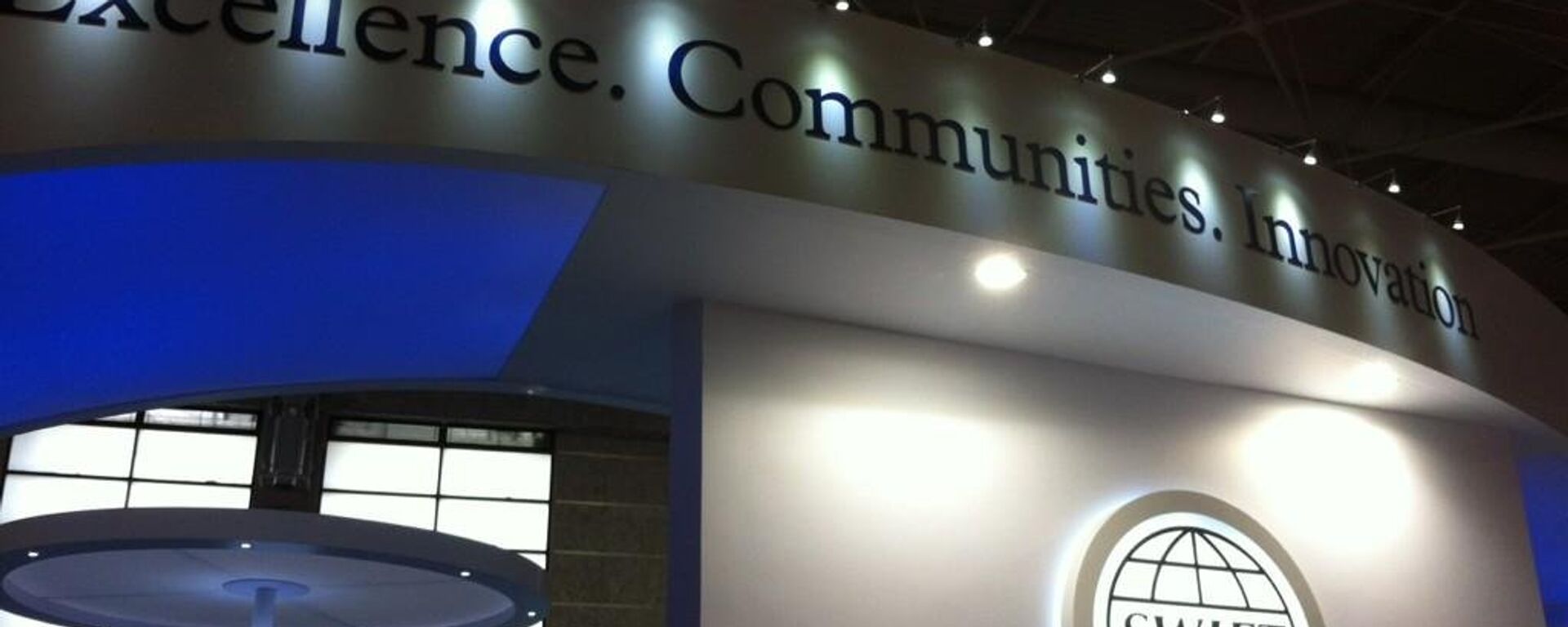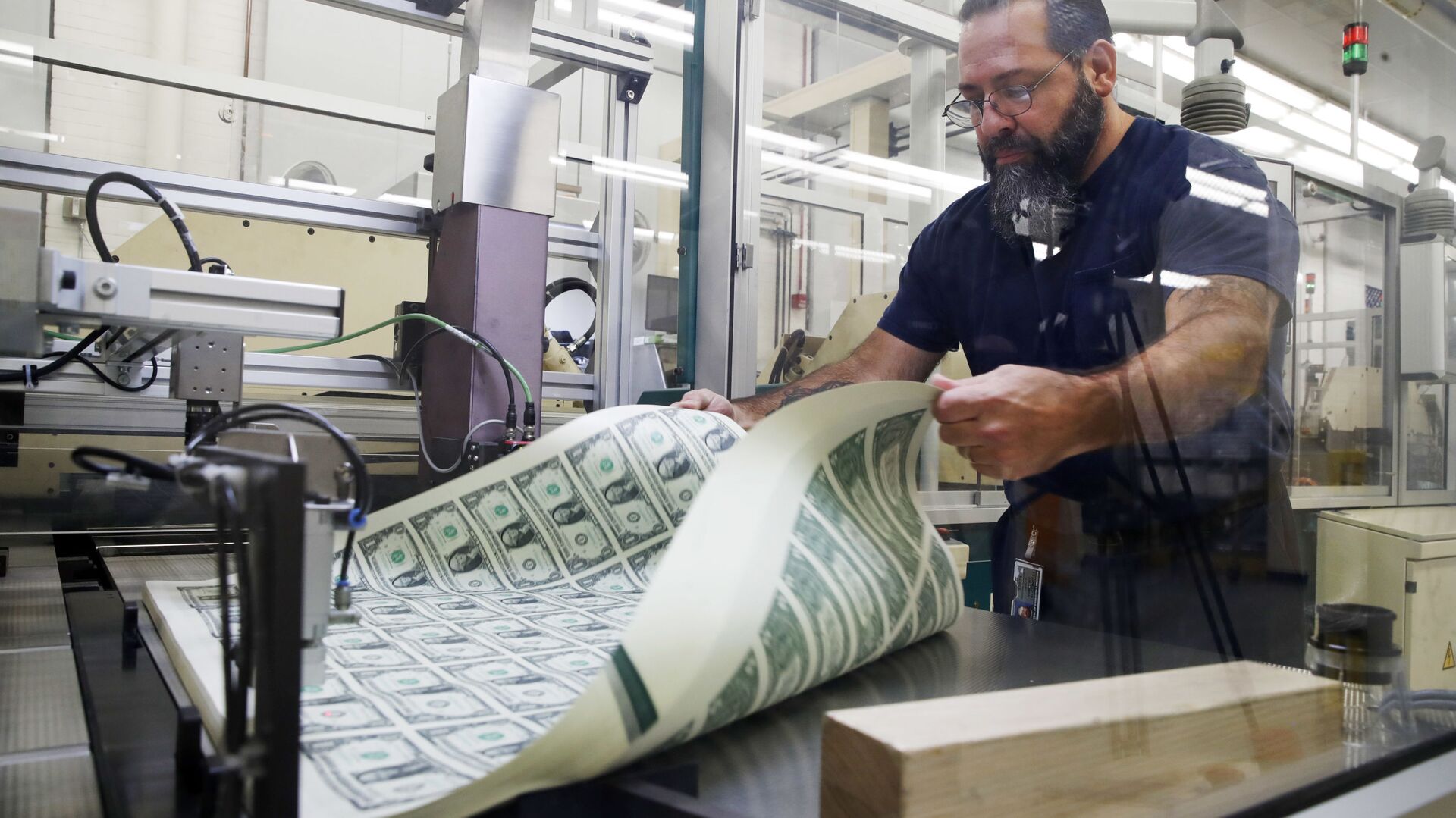https://sputnikglobe.com/20220310/emerging-economies-should-diversify-their-forex-reserves-out-of-us-dollars-says-indian-economist-1093745715.html
Emerging Economies Should Diversify Their Forex Reserves Out Of US Dollars, Says Indian Economist
Emerging Economies Should Diversify Their Forex Reserves Out Of US Dollars, Says Indian Economist
Sputnik International
The US and European Union have decided to freeze forex reserves belonging to Russia worth around $630 billion amid the ongoing Ukrainian crisis. Experts... 10.03.2022, Sputnik International
2022-03-10T14:40+0000
2022-03-10T14:40+0000
2022-11-18T13:40+0000
brazil
russia
afghanistan
iran
swift
us
joe biden
sanctions
https://cdn1.img.sputnikglobe.com/img/107832/36/1078323692_0:161:3071:1888_1920x0_80_0_0_2de0f78b86336393bdd05169c2b8ebde.jpg
The US and its allies have declared "economic war" against Russia by attempting to cut off the $1.7-trillion economy from the global financial system in response to Moscow's special military operation in Ukraine at the request of the Donbass region's republics.Besides imposing sanctions on political leaders, businessmen, and banks, the West has frozen $630 billion of forex reserves belonging to Russia - one of the world's biggest exporters of oil, gas, and metals - stashed in different parts of the world. In the past, the US has imposed similar restrictions on the forex reserves of Afghanistan, Iran, Cuba, Iran, and Venezuela, clearly indicating that the US has a monopoly over granting access to dollar reserves in what can be seen as a confirmation that politics often come into play in the matter. Sputnik spoke with Professor NR Bhanumurthy, economist and vice-chancellor at Bengaluru's Dr BR Ambedkar School of Economics University in the state of Karnataka about the US' actions against Russia.Sputnik: The recent decision by the US to cease holding Afghan and Russian forex reserves has raised concerns among some Indian intellectuals who suggest that India's foreign exchange reserves should be systematically diversified. What do you think about the US' move and should India's central bank, the RBI, diversify its reserves?Dr NR Bhanumurthy: Whether it is private or public wealth, it is important to diversify financial assets to mitigate any unexpected risks. Recent events in Afghanistan and Russia only suggest it is vital, not only for India but for all emerging market economies, to diversify their forex reserves.But there are also limits to the extent of diversification as a large part of trade, both in current and capital accounts, takes place in US dollars.Sputnik: The latest RBI data suggests its gold reserves are valued at $42.5 billion, representing around 7 percent of total forex holdings. Should the RBI increase its gold reserves? How can that help India?Dr NR Bhanumurthy: The extent of gold reserves are determined by both strategic as well as by domestic demand. Changes in the extent of such reserves depend on how risky other portfolios, in this case foreign currencies are considered to be. Sputnik: The absolute value of gold reserves has kept rising in recent years, but the earnings on RBI's forex currency assets are abysmal because of low-interest rates in the West. What options does the RBI have to maximise value?Dr NR Bhanumurthy: The objective of forex reserves is not necessarily only to earn interest - it has many objectives. On the other hand, although nominal interest rates in India are higher, if one looks at real interest rates, there is not much difference between the currencies in the long run.Sputnik: There is a worrying scenario now whereby the dollar strengthens against the Indian rupee - or some other currencies - to a record level despite the ballooning US current account deficit. This may affect India's import bill massively. Can India sign currency swap agreements with Middle Eastern countries to reduce the oil import cost?Dr NR Bhanumurthy: We've been discussing currency swap for a long time, but there are some intrinsic risks associated with it. They are not determined by market forces but by individual governments or central banks.India-Iran negotiations are still on, and I hope some better solutions come out of those negotiations.Sputnik: An Indian parliamentary committee report suggested that Government should explore alternatives to the SWIFT payment system. What do you think of this idea?Dr NR Bhanumurthy: The payment settlement system should not be limited to a few. India has already successfully launched the RuPay card, an alternative to global card payment systems such as Visa and Mastercard. Any alternative systems that reduces the costs of transaction must be explored.
https://sputnikglobe.com/20211217/indian-government-urged-to-set-up-alternative-to-swift-payment-system-over-us-misuse-1091575131.html
brazil
afghanistan
iran
Sputnik International
feedback@sputniknews.com
+74956456601
MIA „Rossiya Segodnya“
2022
Rishikesh Kumar
https://cdn1.img.sputnikglobe.com/img/07e4/08/04/1080055820_0:0:388:389_100x100_80_0_0_40018ee210946d65d49ffba4f4c008e1.jpg
Rishikesh Kumar
https://cdn1.img.sputnikglobe.com/img/07e4/08/04/1080055820_0:0:388:389_100x100_80_0_0_40018ee210946d65d49ffba4f4c008e1.jpg
News
en_EN
Sputnik International
feedback@sputniknews.com
+74956456601
MIA „Rossiya Segodnya“
Sputnik International
feedback@sputniknews.com
+74956456601
MIA „Rossiya Segodnya“
Rishikesh Kumar
https://cdn1.img.sputnikglobe.com/img/07e4/08/04/1080055820_0:0:388:389_100x100_80_0_0_40018ee210946d65d49ffba4f4c008e1.jpg
brazil, afghanistan, iran, swift, us, joe biden, sanctions
brazil, afghanistan, iran, swift, us, joe biden, sanctions
Emerging Economies Should Diversify Their Forex Reserves Out Of US Dollars, Says Indian Economist
14:40 GMT 10.03.2022 (Updated: 13:40 GMT 18.11.2022) The US and European Union have decided to freeze forex reserves belonging to Russia worth around $630 billion amid the ongoing Ukrainian crisis. Experts worldwide have criticised the US move, describing this as the weaponisation of the monetary system, which may prompt a new geo-economic order in the world.
The US and its allies have declared
"economic war" against Russia by attempting to cut off the $1.7-trillion economy from the global financial system in response to Moscow's special military operation in Ukraine at the request of the Donbass region's republics.
Besides imposing sanctions on political leaders, businessmen, and banks, the West has frozen
$630 billion of forex reserves belonging to Russia - one of the world's biggest exporters of oil, gas, and metals - stashed in different parts of the world.
In the past, the US has imposed similar restrictions on the forex reserves of Afghanistan, Iran, Cuba, Iran, and Venezuela, clearly indicating that the US has a monopoly over granting access to dollar reserves in what can be seen as a confirmation that politics often come into play in the matter.
Sputnik spoke with Professor NR Bhanumurthy, economist and vice-chancellor at Bengaluru's Dr BR Ambedkar School of Economics University in the state of Karnataka about the US' actions against Russia.
Sputnik: The recent decision by the US to cease holding Afghan and Russian forex reserves has raised concerns among some Indian intellectuals who suggest that India's foreign exchange reserves should be systematically diversified. What do you think about the US' move and should India's central bank, the RBI, diversify its reserves?
Dr NR Bhanumurthy: Whether it is private or public wealth, it is important to diversify financial assets to mitigate any unexpected risks. Recent events in Afghanistan and Russia only suggest it is vital, not only for India but for all emerging market economies, to diversify their forex reserves.
The Reserve Bank of India does diversify and it is not necessarily the case that all of India's reserves are invested in the US ... indeed we also have a significant component of gold reserves, and currency assets other than the US dollar.
But there are also limits to the extent of diversification as a large part of trade, both in current and capital accounts, takes place in US dollars.
Sputnik: The latest RBI data suggests its gold reserves are valued at $42.5 billion, representing around 7 percent of total forex holdings. Should the RBI increase its gold reserves? How can that help India?
Dr NR Bhanumurthy: The extent of gold reserves are determined by both strategic as well as by domestic demand. Changes in the extent of such reserves depend on how risky other portfolios, in this case
foreign currencies are considered to be.
The RBI should be in a better position to decide on how big its gold reserves are. Ultimately it is important to see that the Indian rupee becomes a reserve currency like the US dollar, euro, etc.
Sputnik: The absolute value of gold reserves has kept rising in recent years, but the earnings on RBI's forex currency assets are abysmal because of low-interest rates in the West. What options does the RBI have to maximise value?
Dr NR Bhanumurthy: The objective of forex reserves is not necessarily only to earn interest - it has many objectives. On the other hand, although nominal interest rates in India are higher, if one looks at real interest rates, there is not much difference between the currencies in the long run.
Sputnik: There is a worrying scenario now whereby the dollar strengthens against the Indian rupee - or some other currencies - to a record level despite the ballooning US current account deficit. This may affect India's import bill massively. Can India sign currency swap agreements with Middle Eastern countries to reduce the oil import cost?
Dr NR Bhanumurthy: We've been discussing
currency swap for a long time, but there are some intrinsic risks associated with it. They are not determined by market forces but by individual governments or central banks.
India-Iran negotiations are still on, and I hope some better solutions come out of those negotiations.

17 December 2021, 10:16 GMT
Sputnik: An Indian parliamentary committee report suggested that Government should explore alternatives to the SWIFT payment system. What do you think of this idea?
Dr NR Bhanumurthy: The payment settlement system should not be limited to a few. India has already successfully launched the RuPay card, an alternative to global card payment systems such as Visa and Mastercard. Any alternative systems that reduces the costs of transaction must be explored.




